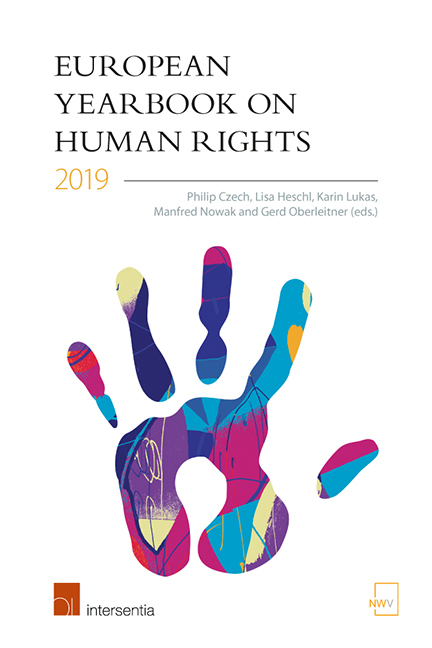Book contents
- Frontmatter
- Miscellaneous Frontmatter
- Editors’ Preface
- Contents
- List of Abbreviations
- List of Contributors
- PART I TOPIC OF THE YEAR
- PART II EU
- PART III CoE
- PART IV OSCE
- Pioneer Decision on Safety of Journalists in the Preceding Context
- If I Could I Would? International Electoral Standards and the Recommendations of Election Observers
- The Right to Political Participation of Persons with Disabilities
- The Right of Children to be Heard through Peaceful Protests
- PART V REPORTS FROM THE FIELD
- PART VI OTHERS
- PART VII BOOK REVIEWS
- Index
Pioneer Decision on Safety of Journalists in the Preceding Context
from PART IV - OSCE
Published online by Cambridge University Press: 24 January 2020
- Frontmatter
- Miscellaneous Frontmatter
- Editors’ Preface
- Contents
- List of Abbreviations
- List of Contributors
- PART I TOPIC OF THE YEAR
- PART II EU
- PART III CoE
- PART IV OSCE
- Pioneer Decision on Safety of Journalists in the Preceding Context
- If I Could I Would? International Electoral Standards and the Recommendations of Election Observers
- The Right to Political Participation of Persons with Disabilities
- The Right of Children to be Heard through Peaceful Protests
- PART V REPORTS FROM THE FIELD
- PART VI OTHERS
- PART VII BOOK REVIEWS
- Index
Summary
ABSTRACT
This contribution singles out and seeks to analyse the most essential elements of the OSCE Ministerial Council Decision on Safety of Journalists, adopted in Milan on 7 December 2018. Those elements aim to create an enabling environment for the media, in particular, through the compliance with specific international obligations, recognition of certain functions of journalists, enumeration of the modern threats to their safety, including digital safety. Authors provide a background on the road to the decision within the OSCE, highlighting the main contradictions among its participating States, and put it in the context of other international commitments on media freedom and freedom of expression. As the first holistic OSCE document on freedom of the media, the decision significantly extends the current set of commitments by the participating States and may pave the way to a global instrument on the subject.
INTRODUCTION
The Organization for Security and Co-operation in Europe (OSCE) was created as a security organisation. However, its comprehensive approach to security, developed in 1975, rests on the recognition that conflicts in Europe may arise not only from political or military threats but also from economic tensions, environmental degradation, and social insecurity, as well as deficiencies in relation to the rule of law and the protection of human rights and fundamental freedoms. The human rights framework adopted by the Conference on Security and Co-operation in Europe (CSCE) stimulated many grassroots initiatives across the region. Many of the original Helsinki Watch groups remain today to hold governments to account for the violations of human rights obligations; some of them joined forces to form what is now known as Human Rights Watch.
Alongside other human rights and fundamental freedoms, freedom of expression, including freedom of information and freedom of the media are now well established and beyond question within the OSCE. Significance of ensuring freedom of the media ‘as a basic condition for pluralistic and democratic societies’ was affirmed in a number of decisions taken by the OSCE participating States following the Helsinki Final Act. In December 2018 the OSCE Ministerial Council adopted a Decision on ‘Safety of Journalists’ (further on – the Decision).
- Type
- Chapter
- Information
- European Yearbook on Human Rights 2019 , pp. 339 - 368Publisher: IntersentiaPrint publication year: 2019



